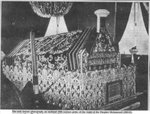Angin Perubahan
Saudi king shakes up government
RIYADH (AFP) – King Abdullah on Saturday made sweeping changes to his government, axing the head of the religious police and appointing Saudi Arabia's first-ever woman deputy minister in the biggest shakeup since he took over the throne.
In major changes that appeared to target conservative religious clerics who dominate the judiciary, he also ousted powerful Supreme Judicial Council head Sheikh Saleh al-Luhaidan, whom Saudi activists say had blocked reforms for years.
The changes also include new education, justice, information and health ministers, a new leader of the consultative Shura council, and a new central bank chief.
Analysts said they indicated Abdullah's determination to put his progressive stamp on the country's arch-conservative institutions.
"This is a turning point. It is the biggest change that happened in this country in 20 years," Mohammad al-Zulfa, a member of the Shura council, told AFP.
Norah al-Fayez, currently an official at the Saudi Institute for Public Administration, became the first woman deputy education minister for female education affairs -- the most senior job ever granted to a woman in the Muslim kingdom.
In another major change, Abdullah sacked hardliner Sheikh Ibrahim al-Ghaith, the head of the Muttawa religious police.
Under Ghaith, the Muttawa, who enforce Saudi Arabia's strict-but-eroding Islamic social mores, such as complete separation of unrelated members of the opposite sexes, have been widely feared.
Ghaith was replaced by Sheikh Abdul Aziz al-Humain, who quickly gave notice of changes to come.
"We will try to be close to the heart of every citizen. Their concerns are ours," Humain told Al-Arabiya news channel.
Abdullah, who ascended the throne after the death of his half-brother King Fahd in August 2005, had made mainly minor changes in the administration since then, amid expectations to put his mark more deeply on the government.
"It is a new start for King Abdullah. People are expecting changes," Zulfa said.
The shake-up included naming Ambassador to Lebanon Abdulaziz al-Khoja as information and culture minister, legal expert Sheikh Mohammed al-Issa as justice minister, and senior national guard official Prince Faisal bin Abdullah bin Mohammed al-Saud as education minister.
At the central bank, Vice Governor Mohammed al-Jasser will replace Hamad Saud al-Sayyari, who had served in the job since 1983 and asked to step down, according to Saudi Finance Minister Ibrahim al-Assaf.
"We don't expect any change. Jasser has been groomed for the job," said a Riyadh investment banker.
Other significant changes included naming a new leader of the official Saudi Human Rights Commission, which earlier this month submitted the country's record for review for the first time ever at the Geneva UN Human Rights Council.
Aging Turki al-Sudairy, who had started up the commission, stepped aside for a board member of the council, Bandar al-Iban.
"The human rights movement is going to lose its biggest ally," Ibrahim al-Mugaiteeb, leader of the Human Rights First Society, told AFP.
The country's justice apparatus, widely seen as archaic and inconsistent, has been targetted by King Abdullah for changes since he came to the throne.
New heads of the administrative court, the supreme council of justice, and the supreme court were named.
"The changes indicate King Abdullah's keenness to bring in new blood of a young generation," Issa, the new justice minister, said on Arabiya television.
The replacement of Luhaidan by Saleh bin Humaid, the outgoing Shura council leader, was the biggest change, according to Mugaiteeb.
Luhaidan, known for numerous declarations rooted in conservative Islam, like one in September that the owners of satellite television stations showing "immoral" shows should be killed, had held the job for more than four decades, according to Mugaiteeb.
"This is what we have been fighting for," he said.
Also, for the first time the king named representatives of all four Sunni Islam schools of religious law to the Council of Ulemas, the leading clerics of the kingdom.
Previously only thinkers from the Hanbali school which dominates the conservative Saudi version of Islam were represented on the council.
Still, the most powerful cabinet positions of defence, interior, and foreign affairs were unchanged, remaining in the hands of the key princes of the royal family who have held the jobs for decades.
But Zulfa said he expects more changes "within six months."










Tiada ulasan:
Catat Ulasan